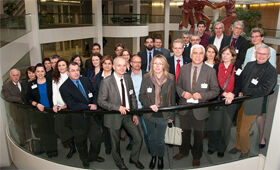German Office for International Vocational Education and Training Cooperation stages a German-Greek workshop
German and Greek education and training experts have engaged in extensive discussions on the opportunities to implement company-based forms of learning in Greece with the framework of a workshop staged by the German Office for International Vocational Education and Training Cooperation (GOVET). This event was occasioned by the project launch of five feasibility studies currently being financed by GOVET. The aims of the studies are to deliver findings with regard to the practicability of company-based learning and to establish a network between Germans and Greeks that will enable the initiation of joint training cooperation projects. Participants generated important impetuses for the structuring of the feasibility studies and for the implementation of German-Greek VET cooperation.

The German Office for International Vocational Education and Training Cooperation staged a workshop involving approximately 35 participants from Germany and Greece on 15 and 16 January 2014.
Those attending included the German and Greek project partners from the feasibility studies, university professors, high-ranking representatives of trade and industry from both countries, VET experts and members of the German-Greek Working Group. The German-Greek Working Group is the policy committee for VET cooperation between the two countries and comprises ministry representatives and social partners.
The workshop began with a joint dinner on the evening of 14 January, at which participants were formally welcomed by Professor Reinhold Weiß, Deputy President and Director of Research of the Federal Institute for Vocational Education and Training (BIBB). The workshop itself was officially opened on 15 January by Mr. Christian Stertz, special advisor for bilateral cooperation agreements in the field of vocational education and training at the Federal Ministry of Education and Research (BMBF).
Tobias Wolfgarten, Project Head for Cooperation with Greece at GOVET expressed his satisfaction with the results of the workshop: "The objective of the workshop was to create a joint basis of knowledge to avoid overlaps and duplicated work in the five feasibility studies. A further aim was to use the networking between the stakeholders to set out the direction of travel for future German-Greek cooperation projects. The active involvement of the participants has enabled us to make major strides towards these goals".
GOVET issued an invitation to tender for five feasibility studies in Greece in October 2013. Five such studies in pursuit of several goals have been funded since 1 December. One aim is to conduct an analysis of potential for the possibility of the introduction of dual training structures. The plan is to determine occupations that are suitable for the introduction of company-based forms of learning in four areas (renewable energies/energy-efficient construction and renovation, transport and logistics, manufacturing industry, tourism) as well as identifying stakeholders who are prepared to participate in a training project involving company-based learning (companies, vocational schools, chambers etc.). Further objectives are to ascertain the support requirements of these stakeholders for the realisation of such a project (e.g. training of trainers and vocational school teachers, development of the examination system) and to establish robust contact networks between the relevant actors who are to form the core players for the implementation of German-Greek training cooperation projects.
The feasibility studies are embedded in the activities agreed on the basis of the Memorandum of Understanding regarding VET cooperation concluded between the German and Greek governments in December 2012. The Ministry of Education and Research (BMBF) is acting as lead manager for the bilateral vocational education and training cooperation agreements.